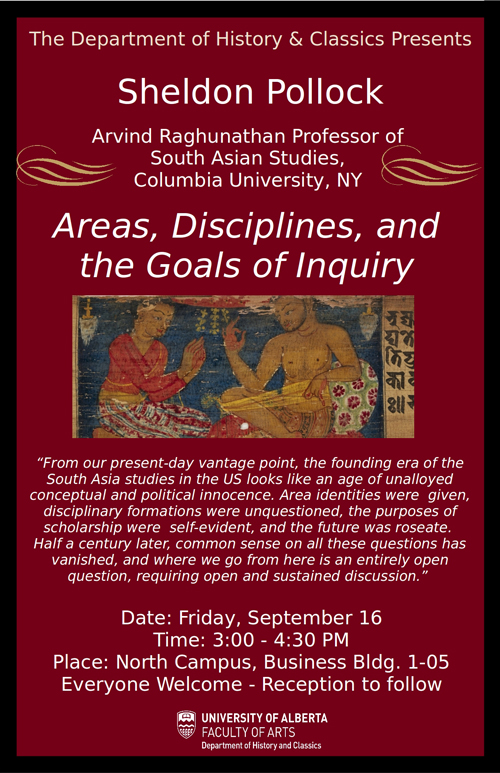From our present-day vantage point, the founding era of the South Asia studies in the US looks like an age of unalloyed conceptual and political innocence. Area identities were given, disciplinary formations were unquestioned, the purposes of scholarship were self-evident, and the future was roseate. Half a century later, common sense on all these questions has vanished, and where we go from here is an entirely open question, requiring open and sustained discussion.

Sheldon Pollock is the Arvind Raghunathan Professor of South Asian Studies. From 2005-2011 he served as the William B. Ransford Professor of Sanskrit and Indian Studies at Columbia, and before that as the George V. Bobrinskoy Distinguished Service Professor of Sanskrit and Indic Studies at the University of Chicago, where he taught from 1989-2005. He was educated at Harvard University, receiving his undergraduate degree in Classics (Greek) magna cum laude in 1971 before earning a Masters (1973) and Ph.D. (1975) in Sanskrit and Indian Studies. His areas of specialization are Sanskrit philology, Indian intellectual and literary history, and, increasingly, comparative intellectual history.
Pollock is General Editor of the Murty Classical Library of India (Harvard U. Press). He was Associate and then General Editor of the Clay Sanskrit Library, for which he also edited and translated a number of volumes, and joint editor of "South Asia across the Disciplines," a collaborative venture of the University of California Press, University of Chicago Press, and Columbia University Press. He directed the international collaborative research project "Sanskrit Knowledge Systems on the Eve of Colonialism." He is currently principal investigator of "SARIT: Enriching Digital Collections in Indology," supported by the National Endowment for the Humanities/Deutsche Forschungsgemeinschaft Bilateral Digital Humanities Program.
His publications include The Language of the Gods in the World of Men: Sanskrit, Culture, and Power in Premodern India (2006), which won the Coomaraswamy Prize from the Association of Asian Studies as well as the Lionel Trilling Award, and most recently Kritische Philologie: Essays zu Literatur, Sprache und Macht in Indien und Europa (2015). Among his edited volumes are Literary Cultures in History: Reconstructions from South Asia (2003), Forms of Knowledge in Early Modern Asia (2011), and (with Benjamin Elman and Kevin Chang) World Philology (2015). Reader on Rasa: Classical Indian Aesthetics, the first in a new series of historical sourcebooks on classical Indian thought he is editing for Columbia University Press, was published this year.